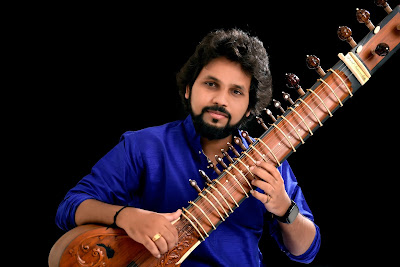I think Sitar has become the face of Indian classical music in the world today. One has to be versatile in today’s scenario. Once you know how to play all kinds of music like Gazal, Bollywood, Fusion, EDM, Rock, Semi-Classical etc. opportunities open up quite easily. However, I think as a classical musician maintaining your own flavour of music without losing the soul of classical music is very important.
1.Tell us more about your background and journey.
I come from a very simple middle-class family where my grandmom use to sing bhajans (a devotional offering to God )every morning. She was not a trained classical musician but I still remember her sweet voice.
At a very early age, I developed an interest in Tabla and my family thought that it is just an obsession of a little kid for music. But once it’s started it went on and is still going on.
2. When did you first decide you wanted to pursue music and how did you start?
So there was a music class near my house and I used to listen to the Tabla sounds, so I asked my granny to take me there and I wanted to play the Tabla. I also used to see some old vintage Indian classical TV recordings on national TV and my family used to think that I am pretending as if I know classical music.
So yes, technically when I was around four or five years old I started learning Tabla with Mr K D Joshi sir. Thereafter, I learnt Tabla under the tutelage of Mr Nitin Pawar Sir and Taalyogi Padmashri Pandit Suresh Dada Talwalkar Ji. So, coming to Sitar I started pursuing Sitar after my high school exams when I was around 17 years old. I started with K D Joshi Sir and Dr Uddhav Aashturkar Ji initially, and then I learnt from Pandit Ravi Chary Ji, one of the internationally known sitar players, under the guru shishya parampara.
3. Who is your favourite artist and why?
There are many artists I admire. To name a few - Ustad Vilayat Khan, Pandit Nikhil Banerjee, Ustad Zakir Hussain & Hariharan Ji are my favourite artists because I feel there is life in their every performance. This is a great thing in itself because music is not about memorising things and throwing them on stage. There should be life in your performance, in your music and in whatever you are doing. It should be as easy and as natural as your breathing.
4. Can you throw some light on opportunities one gets as a sitarwadak?
I think Sitar has become the face of Indian classical music in the world today. One has to be versatile in today’s scenario. Once you know how to play all kinds of music like Gazal, Bollywood, Fusion, EDM, Rock, Semi-Classical etc. opportunities open up quite easily. However, I think as a classical musician maintaining your own flavour of music without losing the soul of classical music is very important.
5. Is formal training required or can one train themselves purely on the basis of talent?
I truly believe that our Indian classical music training system (guru shishya parampara) is not only about playing or singing good music and entertainment, but it’s also about finding the inner spirit, or the inner soul which I think goes a lot deeper than what we call ‘talent’.
So one has to be ready to work on oneself because when you practice, you are not only working on your music but also working on yourself to be a better and greater version of Yourself. And when you become that version, MUSIC HAPPENS.
6. What piece of advice would you like to give to future and aspiring artists?
Dig deep into the ocean of your music, your oneness. Because in the future AI will produce faster & more technical music than a human can. But it can’t touch a human soul. To do that one has to pluck the strings from one's own heart.











0 Comments